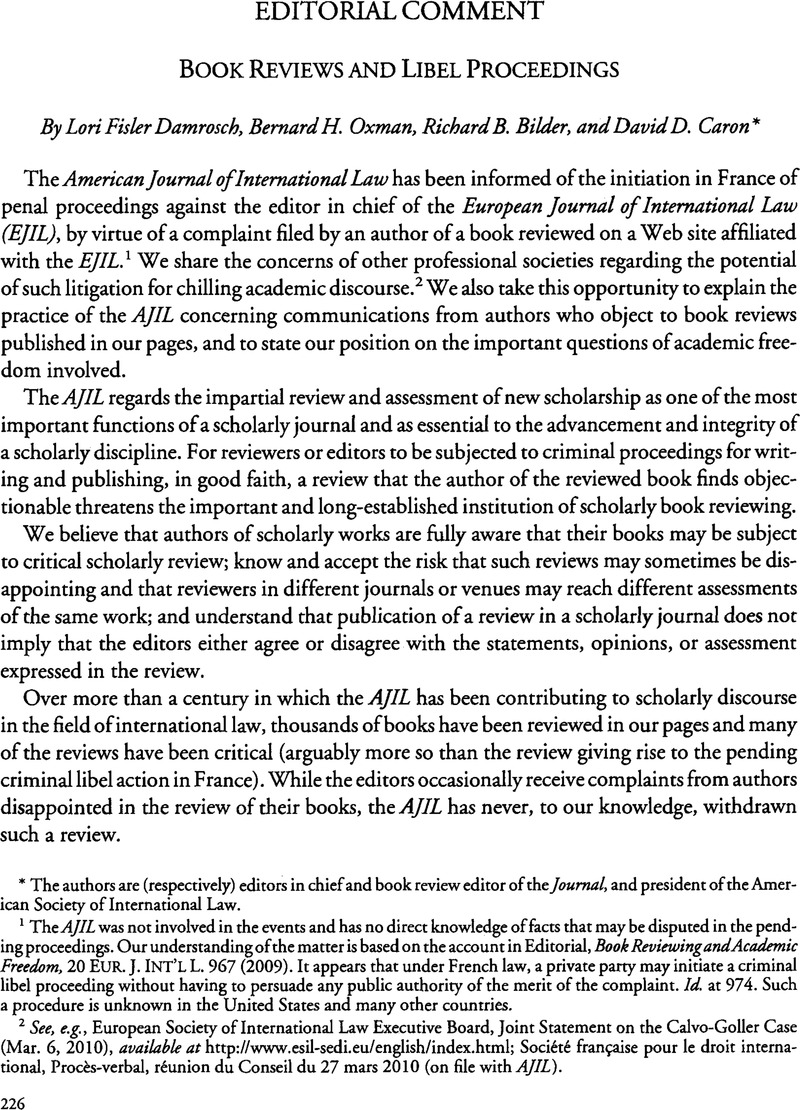Article contents
Book Reviews and Libel Proceedings
Published online by Cambridge University Press: 27 February 2017
Abstract

- Type
- Editorial Comment
- Information
- Copyright
- Copyright © American Society of International Law 2010
References
1 The AJIL was not involved in the events and has no direct knowledge of facts that may be disputed in the pending proceedings. Our understanding of the matter is based on the account in Editorial, Book Reviewing and Academic Freedom , 20 Eur. J. Int’l L. 967 (2009)Google Scholar. It appears that under French law, a private party may initiate a criminal libel proceeding without having to persuade any public authority of the merit of the complaint. Id. at 974. Such a procedure is unknown in the United States and many other countries.
2 See, e.g., European Society of International Law Executive Board, Joint Statement on the Calvo-Goller Case (Mar. 6, 2010), available at http://www.esil-sedi.eu/english/index.html Google Scholar; Société française pour le droit international, Procès-verbal, réunion du Conseil du 27 mars 2010 (on file with AJIL).
3 In this regard we think that the EJIL’s editor in chief was correct in observing that it is “not the custom of most Book Reviews . . . to offer the possibility of writing a comment on reviews” and that “[v]ery few authors, whose books are negatively reviewed, have such a facility.” Editorial, supra note 1, at 973. We have not had occasion to confront the hypothetical instance suggested by the EJIL’s editor in chief of “extreme categories of egregious unreasonableness,” such as bad faith or conflict of interest, id. at 970, and thus we express no view on the appropriate editorial response should such circumstances come to the attention of the editors after publication of a review.
4 For examples, see letter at 104 AJIL 228 (2010), correcting an inadvertent misstatement in the review at 104 AJIL 150 (2010); and letter at 101 AJIL 141 (2007), correcting an inadvertent misattribution in the review at 100 AJIL 978 (2006). A similar practice is followed when we learn of errors in other sections of the Journal. See, e.g., letter at 101 AJIL 141 (2007), correcting an inadvertent misstatement in an essay published at 100 AJIL 551 (2006).
5 For examples, see letter at 102 AJIL 309 (2008) regarding the review of the author’s book at 101 AJIL 913 (2007); letter at 98 AJIL 743 (2004) regarding the review of the author’s book at 98 AJIL 374 (2004), and reviewer’s reply.
6 See, e.g., Universal Declaration of Human Rights, Art. 19, GA Res. 217A (III), UN GAOR, 3d Sess., Resolutions, at 71, UN Doc. A/810 (1948); International Covenant on Civil and Political Rights, Art. 19(2), Dec. 16, 1966, 999 UNTS 171; European Convention on the Protection of Human Rights and Fundamental Freedoms, Art. 10(1), Nov. 4, 1950, 213 UNTS 221.
- 1
- Cited by




